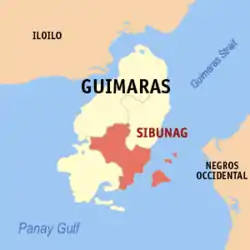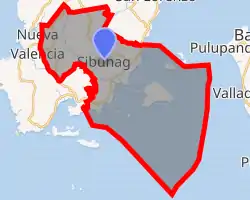Sibunag
Sibunag, officially the Municipality of Sibunag (Hiligaynon: Banwa sang Sibunag; Tagalog: Bayan ng Sibunag), is a 4th class municipality in the province of Guimaras, Philippines. According to the 2015 census, it has a population of 22,158 people. [3]
Sibunag | |
|---|---|
| Municipality of Sibunag | |
 Provincial road | |
 Map of Guimaras with Sibunag highlighted | |
OpenStreetMap 
| |
.svg.png.webp) Sibunag Location within the Philippines | |
| Coordinates: 10°30′16″N 122°37′52″E | |
| Country | |
| Region | Western Visayas (Region VI) |
| Province | Guimaras |
| District | Lone district |
| Founded | 1995 |
| Barangays | 14 (see Barangays) |
| Government | |
| • Type | Sangguniang Bayan |
| • Mayor | Annabelle V. Samaniego |
| • Vice Mayor | Mervin V. Infante |
| • Representative | Ma. Lucille L. Nava |
| • Electorate | 14,730 voters (2019) |
| Area | |
| • Total | 120.04 km2 (46.35 sq mi) |
| Elevation | 65 m (213 ft) |
| Population | |
| • Total | 22,158 |
| • Density | 180/km2 (480/sq mi) |
| • Households | 4,968 |
| Economy | |
| • Income class | 4th municipal income class |
| • Poverty incidence | 24.95% (2015)[4] |
| • Revenue | ₱66,816,470.60 (2016) |
| Time zone | UTC+8 (PST) |
| ZIP code | 5048 |
| PSGC | |
| IDD : area code | +63 (0)33 |
| Climate type | tropical climate |
| Native languages | Hiligaynon Ati Tagalog |
Its territory includes the islands of Inampulugan, Natugna, and several other minor islets in the Guimaras Stait.
The town was created by virtue of Republic Act No. 7896 on February 20, 1995.[5]
Barangays
Sibunag is politically subdivided into 14 barangays. [2]
- Alegria
- Ayangan
- Bubog
- Concordia
- Dasal (Poblacion)
- Inampulugan
- Maabay
- Millan
- Oracon
- Ravina
- Sabang
- San Isidro
- Sebaste
- Tanglad
Climate
| Climate data for Sibunag, Guimaras | |||||||||||||
|---|---|---|---|---|---|---|---|---|---|---|---|---|---|
| Month | Jan | Feb | Mar | Apr | May | Jun | Jul | Aug | Sep | Oct | Nov | Dec | Year |
| Average high °C (°F) | 30 (86) |
31 (88) |
32 (90) |
33 (91) |
32 (90) |
30 (86) |
29 (84) |
29 (84) |
28 (82) |
29 (84) |
30 (86) |
30 (86) |
30 (86) |
| Average low °C (°F) | 21 (70) |
21 (70) |
22 (72) |
23 (73) |
24 (75) |
24 (75) |
24 (75) |
24 (75) |
24 (75) |
24 (75) |
23 (73) |
22 (72) |
23 (73) |
| Average precipitation mm (inches) | 19 (0.7) |
17 (0.7) |
26 (1.0) |
37 (1.5) |
119 (4.7) |
191 (7.5) |
258 (10.2) |
260 (10.2) |
248 (9.8) |
196 (7.7) |
97 (3.8) |
39 (1.5) |
1,507 (59.3) |
| Average rainy days | 7.2 | 5.2 | 8.3 | 11.9 | 22.3 | 26.5 | 28.3 | 28.2 | 27.3 | 26.4 | 18.7 | 11.8 | 222.1 |
| Source: Meteoblue [6] | |||||||||||||
Demographics
| Year | Pop. | ±% p.a. |
|---|---|---|
| 1995 | 17,773 | — |
| 2000 | 20,104 | +2.68% |
| 2007 | 17,552 | −1.85% |
| 2010 | 19,565 | +4.03% |
| 2015 | 22,158 | +2.40% |
| Source: Philippine Statistics Authority [3] [7] [8][9] | ||
In the 2015 census, the population of Sibunag was 22,158 people, [3] with a density of 180 inhabitants per square kilometre or 470 inhabitants per square mile.
References
- Municipality of Sibunag | (DILG)
- "Province: Guimaras". PSGC Interactive. Quezon City, Philippines: Philippine Statistics Authority. Retrieved 12 November 2016.
- Census of Population (2015). "Region VI (Western Visayas)". Total Population by Province, City, Municipality and Barangay. PSA. Retrieved 20 June 2016.
- "PSA releases the 2015 Municipal and City Level Poverty Estimates". Quezon City, Philippines. Retrieved 12 October 2019.
- "Republic Act No. 7896 - An Act Creating the Municipality of Sibunag in the Province of Guimaras". Chan Robles Virtual Law Library. 20 February 1995. Retrieved 28 January 2016.
- "Sibunag: Average Temperatures and Rainfall". Meteoblue. Retrieved 28 April 2020.
- Census of Population and Housing (2010). "Region VI (Western Visayas)". Total Population by Province, City, Municipality and Barangay. NSO. Retrieved 29 June 2016.
- Censuses of Population (1903–2007). "Region VI (Western Visayas)". Table 1. Population Enumerated in Various Censuses by Province/Highly Urbanized City: 1903 to 2007. NSO.
- "Province of Guimaras". Municipality Population Data. Local Water Utilities Administration Research Division. Retrieved 17 December 2016.
External links
 Media related to Sibunag, Guimaras at Wikimedia Commons
Media related to Sibunag, Guimaras at Wikimedia Commons- Sibunag Profile at PhilAtlas.com
- Official webpage of the Province of Guimaras: Sibunag
- Philippine Standard Geographic Code
- Philippine Census Information
This article is issued from Wikipedia. The text is licensed under Creative Commons - Attribution - Sharealike. Additional terms may apply for the media files.